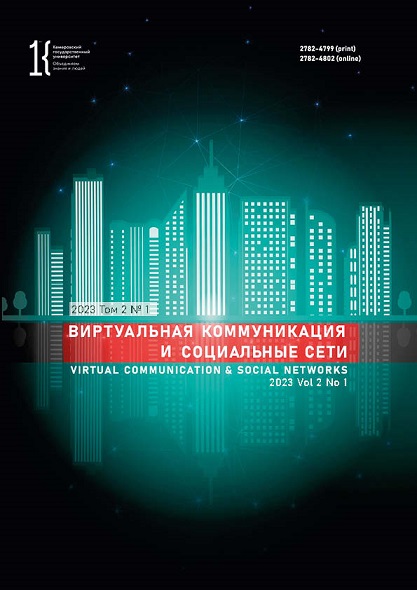Chelyabinsk, Russian Federation
Most institutions of higher education have official websites that are represented in social networks and messengers, thus providing students with relevant information. Patriotic education being a state priority, university media can also help to raise patriotism in students and develop an objective view of this state value. This research featured the Telegram channel of the Chelyabinsk State University in 2020–2022. The medialinguistic method made it possible to reveal the peculiarities of interaction between verbal and non-verbal sequences while the pragmalinguistic analysis helped to establish the communicative intention of the media text. The messages were multimodal and combined different types of information. The greatest pragmatic impact belonged to the publications that combined visual, textual, and auditory information. Patriotic narrative resonated with the target audience through a compilation of verbal and non-verbal components, such as facial expressions, gestures, intonation, body movement, and postures, that aimed at one and the same pragmatic effect.
university media discourse, social media, telegram channel, media linguistics, pragmatics, multimodality, patriotism, patriotic education
1. Vasileva N. B. Patriotic education of students in Russian Universities. Problemy sovremennoy nauki i obrazovaniya, 2016, (5): 221-226. (In Russ.)] https://www.elibrary.ru/vrbxlv
2. Gorshkova M. A. Patriotic education of students as the basis of civil formation of youth. Socio-humanitarian problems of our time: Proc. Intern. Sci.-Prac. Conf., Belgorod 24 Apr 2020. Belgorod: APNI, 2020, 76-78. (In Russ.)] https://www.elibrary.ru/bvlvve
3. Kochneva Yu. E., Pastukhova O. D., Titova E. A. Peculiarities of the community "School Graduates FLIP CSU" of the Faculty of Linguistics and Translation at Chelyabinsk State University in the social network "VKontakte". Word, utterance, text: cognitive, pragmatic and cultural aspects: Proc. XI Intern. Sci. Conf., Chelyabinsk, 7-9 Apr 2022. Chelyabinsk: ChelSU, 2022, pt. 1, 55-59. (In Russ.)] https://doi.org/10.47475/9785727118047_55
4. Lashova A. A., Kulnazarova A. V. Comparative analysis of the content of higher education institutions in social networks in the context of the COVID-19 pandemic. Vest. Gumanit. fakulteta Sankt-Peterb. gos. un-ta telekommunikatsiy im. prof. M. A. Bonch-Bruevicha, 2020, (12): 79-84. (In Russ.)] https://www.elibrary.ru/ewkhwo
5. Olizko N. S. University massmedia discourse. Word, utterance, text: cognitive, pragmatic and cultural aspects: Proc. XI Intern. Sci. Conf., Chelyabinsk, 7-9 Apr 2022. Chelyabinsk: ChelSU, 2022, pt. 1, 87-89. (In Russ.)] https://doi.org/10.47475/9785727118047_87
6. Semenov A. A. Social networks as a tool of patriotic education of youth. Youth policy: state, problems, and prospects: Proc. Correspondence Sci.-Prac. Conf., St. Petersburg, 31 Aug 2020. St. Petersburg: DMSPb, 2020, 79-84. (In Russ.)] https://www.elibrary.ru/vdmflh
7. Sotnikova E. S. Linguocreative content of university media discourse and the use of social networks in foreign language teaching. Actual problems of studying and teaching philological disciplines at school and university: Proc. All-Russian Sci.-Prac. Conf., Nizhny Tagil, 28 Jan 2021. Moscow: Mir nauki, 2021, 67-71. (In Russ.)] https://www.elibrary.ru/bhwdee
8. Finogeeva A. A., Olizko N. S. The multimodality of university media discourse. Bulletin of Chelyabinsk State University, 2022, (9): 218-225. (In Russ.)] https://doi.org/10.47475/1994-2796-2022-10928
9. Sotnikova E. S. Creative linguistic means in Covid-19 public advertising discourse. Word, utterance, text: cognitive, pragmatic and cultural aspects: Proc. XI Intern. Sci. Conf., Chelyabinsk, 7-9 Apr 2022. Chelyabinsk: ChelSU, 2022, pt. 1, 107-110. https://doi.org/10.47475/9785727118047_107















